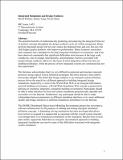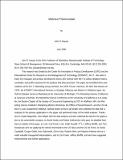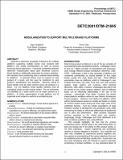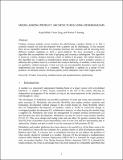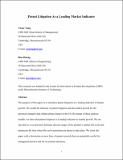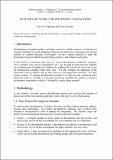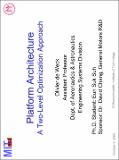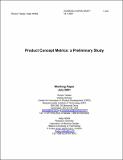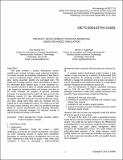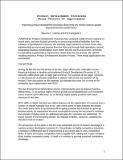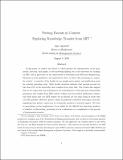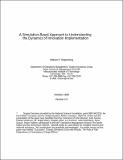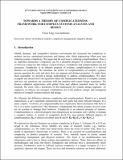Browsing Center for Innovation in Product Development (CIPD) by Title
Now showing items 11-30 of 35
-
Integrated Simulation and Design Synthesis
(2001)The potential benefits of mathematically predicting and analyzing the integrated behavior of product concepts throughout the design synthesis cycle are widely recognized. Better up-front integrated design will not only ... -
Meanings, Measures, Maps, and Models: Understanding the Mechanisms of Continuous Change
(2000-11)There is now considerable controversy concerning the role that incremental change plays in the process of organizational transformation. Some scholars assert that incremental change is the primary source of resistance to ... -
Metrics Thermostat
(2001-07)The explosion of information and information technology has led many firms to evolve a dispersed product development process with people and organizations spread throughout the world. To coordinate such dispersed processes ... -
Metrics Thermostat
(2001-07)The explosion of information and information technology has led many firms to evolve a dispersed product development process with people and organizations spread throughout the world. To coordinate such dispersed processes ... -
Modeling Complex Behavior Simply with Embedded System Engineering
(2000)Newton’s second law as written appears simple, but how to use the law perceptually is a complex task. Most of the cases it is good for conceptual discussion or development. Normally the sign convention is not shown and ... -
Modularization to Support Multiple Brand Platforms
(2001-09-09)Methods to determine acceptable architecture for multiple platforms supporting multiple brands must represent both platform cost saving commonization as well as revenue enhancing brand distinctions. Functional architecting ... -
Modularizing Product Architectures Using Dendrograms
(2003)A module is a structurally independent building block of a larger system with well-defined interfaces. A module is fairly loosely connected to the rest of the system allowing an independent development of the module as ... -
Organizational Languages
(2003-11-11)The paper is concerned with communication within a team of players trying to coordinate in response to information dispersed among them. The problem is nontrivial because they cannot communicate all information instantaneously, ... -
Patent Litigation As a Leading Market Indicator
(2001)The purpose of this paper is to introduce patent litigation as a leading indicator of market growth. We model the intensity of patent litigation and the market growth for the personal computer and cellular phone market ... -
Patterns of Product Development Interactions
(2001-08-21)Development of complex products and large systems is a highly interactive social process involving hundreds of people designing thousands of interrelated components and making millions of coupled decisions. Nevertheless, ... -
Platform Architecture A Two-Level Optimization Approach
(2002-10-03)Introduction to Platform Architecture in Products VW Golf 2 -Automotive Platforming Example:A Two-Level Optimization Approach 3 -Discussion -
Product Concept Metrics: a Preliminary Study Working Paper
(2001-07)Metrics for product concept evaluation and screening is a relatively unstudied topic of product development. Having a clearly documented set of metrics for concept screening decisions is a prerequisite for an educated and ... -
Product Development Process Modeling Using Advanced Simulation
(2001-09)This paper presents a product development process modeling and analysis technique using advanced simulation.The model computes the probability distribution of lead time in a resource-constrained project network where ... -
Product Development Processes, Three Vectors Of Improvement
(2003)Product Development Processes have achieved a state of some maturity in recent years, but have focused primarily on structuring technical activities from the initiation of development to launch. We advocate major advances ... -
Putting Patents in Context:Exploring Knowledge Transfer from MIT
(2001-08-09)In this paper we explore the degree to which patents are representative of the magnitude, direction, and impact of the knowledge spilling out of the university by focusing on MIT, and in particular on the departments of ... -
A Simulation-Based Approach to Understanding the Dynamics of Innovation Implementation
(1999-10)The history of management practice is filled with innovations that failed to live up to the promise suggested by their early success. A paradox facing organization theory is that the failure of these innovations often ... -
Surviving the Gales of Creative Destruction: The Patterns of Innovative Activity in the Desktop Laser Printer Industry
(2000-07-14)In this paper, we examine the product life cycle in the desktop laser printer industry, from its inception in 1984 through 1996. During this time, the industry experienced a significant degree of innovation, as well as an ... -
Towards a Theory of Complicatedness: Framework for Complex Systems Analysis and Design
(2001-08)Global, dynamic, and competitive business environment has increased the complexity in product, service, operational processes and human side. Much engineering effort goes into reducing systems complexity. We argue that ... -
Transferring, Translating and Transforming: An Integrative Framework
(2002-03-10)Organizations must establish processes for managing knowledge across boundaries because of the specialized and task-dependent forms of knowledge required to deliver products and services. To address this challenge an ... -
Transferring, Translating and Transforming: An Integrative Framework
(2002-03-10)Organizations must establish processes for managing knowledge across boundaries because of the specialized and task-dependent forms of knowledge required to deliver products and services. To address this challenge an ...

